A couple of years ago, if you had driven an hour north of downtown LA you would have been in a war zone, a slice of hellish Iraq right there in the arid desert of California.
An American unit of young men and women is pinned down by insurgents holed up in the mosque on the hill, all around them a parched landscape is peppered by gunfire.
A jeep explodes, a soldier in full combat gear rolls in the dry earth under a sweltering sky — and then a guy in jeans and a t-shirt ambles past with a cheese platter, biscuits and a range of cold drinks. The shooting stops and all the players in this human drama head for the shade to shelter from the 35 degree heat.
This was the location of Over There, a controversial television drama series by producer Steven Bochco and writer Chris Gerolmo.
Set in the battle zones of present day Iraq, the uncompromisingly realistic series drew flak and praise from all sides in the American media. Some saw it as undermining the morale of the young men and women on the front, others argued it glorified the excitement and drama of war for the purposes of a television series.
Some said it was a necessary piece of television drama and noted that during the Vietnam era only a couple of films were made where that war was the setting.
If the first casualty of war is truth, then in America at the time fiction was not far behind.
Over There – about a company of young soldiers in Iraq – was first wounded by an unsympathetic audience, then put out of its misery by Fox executives after just one season.
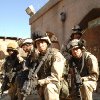 More than four million in the US watched that uncompromising opening episode, but only 1.3 million viewers tuned in for the final.
More than four million in the US watched that uncompromising opening episode, but only 1.3 million viewers tuned in for the final.
Created by Gerolmo and Bochco (the latter devised the innovative Hill Street Blues, NYPD Blue and LA Law), Over There proved too uncomfortable for an American public with increasing doubts about the war, but even less interest in a series in which their troops were portrayed as often unheroic, sometimes confused and occasionally nasty bastards.
Any show in which a central character gets his leg blown off at the end of the first episode is almost asking viewers to change channels. And when one American soldier, the fatalistic Mrs B, stands over the body of an insurgent, slowly crushing his dead fingers beneath her boot, we are invited to think that the humiliations at Abu Ghraib probably started with just such small but calculated incidents.
Despite conforming to ensemble clichés – the unit includes two women (one white, one Hispanic), two blacks (one from the ’hood, the other educated and sensitive), and two white guys (the wide-eyed Texan football hero, and an intellectual who ponders the heart of darkness that war reveals) – Over There didn’t flinch from uncomfortable truths.
One captured leader of an insurgent group screamed, “Now you will take me to Abu Ghraib. Do you have a bag for my head? Do you want me to take my clothes off now?”
 Much of what unfolded on- screen, which was often filmed through night-vision lenses and filters to imitate news footage, seemed ripped from frontline soldiers’ reports home.
Much of what unfolded on- screen, which was often filmed through night-vision lenses and filters to imitate news footage, seemed ripped from frontline soldiers’ reports home.
The nail-biting second episode, in which the unit manned a roadblock and, faced with civilian vehicles speeding toward them, had to make quick judgments with fatal consequences, was lifted from Generation Kill, Rolling Stone journalist Evan Wright’s account of travelling with a Marine Corp special operations unit in the first days of the war.
The series’ technical consultant was a Marine staff sergeant who served in Iraq, and those who have been in the war zone testify that Over There was often disturbingly accurate. It was justifiably acclaimed by TV writers for its realism.
Even so, it drew criticism from all sides of the American media, some accusing it of glamorising the camaraderie and excitement of war, others angered that it refused to take a clear political position.
Bochco insisted he was never going to be drawn into that debate, and Gerolmo set himself clear parameters.
“It is about war and the human consequences of war, and that doesn’t have anything to do with the politics of left and right or Democrat or Republican, or American foreign policy. We’re not writing about American foreign policy makers, we’re writing about 20-year-old privates.
“Once you write about war and the human consequences, you are going to offend people who don’t want people to see this kind of material, so on that level it is going to be controversial.”
Over There also dealt with the boredom of soldiering, the folks back home – the alcoholic wife, loyal partners and worried parents – and attempted some perspective on Middle East opinions.
When the Arab-American soldier Tariq tries to explain to his colleagues why young Saudis have joined the conflict, Gerolmo gave him an analogy that viewers on the couch might understand: it’s like being a hippie in the 60s and hearing about Woodstock. You can’t just not go.
“It’s jihad, the holy war against the Americans. For some of these kids, it’s like the most exciting thing that’s ever happened in their world.”
That wasn’t what many American viewers wanted to hear.
In the face of dwindling audiences, Gerolmo defended his lightning-rod programme: “I think we are doing exactly what television is supposed to do. We are bringing the world to your living-room in a powerful and sometimes harrowing, realistic way, and as accurately as we can. If we are affecting national and international conversation about the war by slightly raising the level of people’s acquaintanceship with what it would be like to be on the ground, that would be a result we’d be proud of.”
He argued news reports can deal with the facts of a military engagement and serve up a casualty list, but fail to address the human drama.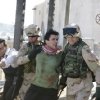
“We’re not exactly trying to fill the holes the news is leaving, but we’re telling stories about these young people in Iraq and putting them in situations in which a lot of people on the ground find themselves. We’re trying to give the audience a feeling for what that would be like.”
Then there is the knotty question of whose side Bochco and Gerolmo are on, if any.
The words Gerolmo writes for his characters catch some of the ambiguous nature of the series.
As the character Dim (sensitive white guy) says in a video message back home at the end of the first episode: “We’re monsters and war is what unmasks us. But there’s a kind of honour in it too, a kind of grace.“
The ambiguity meant the series wasn’t any easy target for political commentators and that pleased Bochco, an industry veteran.
“If we are an equal opportunity offender on some level, then I figure we are doing our job.”
But Bochco was also adamant they were simply making a television series just like NYPD Blue which was also about human drama.
“If you are going to say we are on shaky moral ground doing a show about a war in Iraq because it is on-going, then you’d also have to argue we’re on shaky moral ground doing a police drama about an urban war that is on-going. And I don’t think we are.
“Everyone knows what this show is about.”
Gerolmo — who wrote and sang the theme to Over There, in addition to directing some episodes — says to achieve realism, and avoid criticism from the military and veterans, Over There pays meticulous attention to accuracy.
The on-set technical advisor was Staff Sergeant Staff Sergent Sean Thomas Bunch, a 10-year veteran of the Marines who had two tours of duty in Iraq. He coached the cast in how soldiers react under fire, how to handle munitions and machinery, and put them through a training regime in full combat gear.
And out on the set, the young cast were unanimously appreciative of a series which they saw as important, although none would be drawn on their own political view of the war.
In an curious piece of life imitating art, many of the actors’ lives bore uncanny similarities to the characters they play: actor Josh Henderson (the gung-ho Bo) comes from Texas and was a football player like his character; Luke McFarland (the intellectual Dim) graduated from the Julliard Drama Division and plays cello; Keith Robinson (the choir singer Angel) was in a group signed to Motown; and Kirk “Sticky” Jones (the ghetto graduate Smoke) is Brooklyn-born, was a member of the hip-hop group ONYX, and appeared in such hard-edge movies as Dead Presidents and Clockers.
All of them have friends who have served in Iraq or the military, and Omid Abtahi — the Middle Eastern GI Tariq who turns up the episode two and is met with suspicion by Smoke — has a brother who served in Afghanistan.
“He has a hard time talking about it,” says Abtahi sitting in his trailer escaping the desert heat. “He tells me about the racial comments he got and I kinda felt it was very similar to how my character feels about it. But [my brother] doesn’t feel comfortable talking about actual combat.
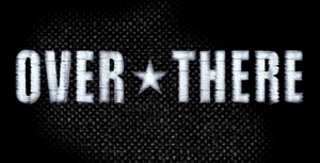 “He was nervous about the show at first but he saw the first two episodes and went, ‘My God, it’s so intense’. It gave him goosebumps at certain moments, like the truck going past before it gets blown up — and the roadblock duty. He said we’d done a really good job.”
“He was nervous about the show at first but he saw the first two episodes and went, ‘My God, it’s so intense’. It gave him goosebumps at certain moments, like the truck going past before it gets blown up — and the roadblock duty. He said we’d done a really good job.”
Abtahi accepts that some people will be uncomfortable with the necessarily graphic nature and sudden violence of the show: in the first episode a man has the top half of his body blown off, in the second an Iraqi child is killed by the soldiers manning a roadblock. But he says Bochco and Gerolmo are trying to write an apolitical story about the reality of frontline war, and how soldiers are changed by the events in which they find themselves.
“We each have our own politics but Steven Bochco said it best, once you get into politics you lose half your audience and it stops being a television show. So I think they are being pretty smart staying away from [politics] . . . as much as it is possible to stay away from it.”
On the walls of Canadian-born actor Luke MacFarlane‘s trailer in the Californian desert is his homework: newspaper photos of Iraq, burned-out tanks and the aftermath of car bombs, of American soldiers moving along a road between swathes of smoke . . .
They aren’t pretty images, but they remind MacFarlane of the character he currently inhabits and the context in which that man lives.
Here in the gravel-strewn, barren desert MacFarlane is playing the thoughtful American GI called Dim by his fellow soldiers.
“One thing the military teaches you, for good reason,” says MacFarlane “is to follow the chain of command. That keeps you alive. But Dim has a hard time with that, he‘s very smart and he thinks outside the box. People do exist in the army that way — but I think it‘s not looked upon as a good thing.”
He scans the images on his wall and talks about how difficult this role is.
“You have an obligation to do a good job of it, so emotionally it is hard. What if someone standing over there had a son or daughter who died in Iraq and they saw me slacking off or being a diva. They would think, ’How dare you?’
“So in that sense it is very hard. And the material is hard. Dim goes to some dark places.”
MacFarlane says before shooting started he read books by embedded reporters such as Rick Atkinson (In The Company of Soldiers) and Wright (Generation Kill).
“One of the most interesting things about this war is it is the first where the infrastructure and technology has been set up in terms of communication. So I found early on I was actually reading a lot of web logs written by soldiers over there, both British and American.”
What MacFarlane learned and brought to his character was that in the downtime soldiers’ thoughts turn to home.
A scene which many find especially moving involves MacFarlane’s character sending a video message back home to his drunken wife whom we see in the background with another man.
“It’s everybody’s biggest fear and if it’s just a mess . . . What my wife is going through, the drinking, is a way of not having to deal with this constant fear of losing your husband, it’s a reaction to it. She wasn’t always a bitch. She medicates herself.”
The stories of the soldiers’ families is a large component of Over There, Bochco estimates almost half the series is about the people back home.
“We wanted to spend a significant amount of time tethering [the soldiers’ lives] to stories about husbands, wives, children and parents of those left behind at home. If we go back and forth we get a much fuller, more dimensional picture about what the consequence of war is to everybody who is connected to it.
“We have no problem with being controversial and doing a show about an arena which by definition will create a certain amount of controversy. What we are adamant about is not letting the show become a political forum for a point of view. That is simply not going to happen.”
It was a courageous series, but probably always doomed.
M*A*S*H, it wasn’t.
Coincidentally, when this Fox cable series ran in the US, the network was also screening Company of Heroes, a two-hour documentary about a Marine company taking Fallujah in November 2004. It was a graphic account of door-to-door fighting, death on the frontline and the fears of those back home.

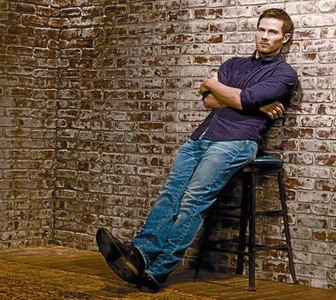








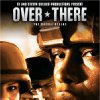
 More than four million in the US watched that uncompromising opening episode, but only 1.3 million viewers tuned in for the final.
More than four million in the US watched that uncompromising opening episode, but only 1.3 million viewers tuned in for the final. Much of what unfolded on- screen, which was often filmed through night-vision lenses and filters to imitate news footage, seemed ripped from frontline soldiers’ reports home.
Much of what unfolded on- screen, which was often filmed through night-vision lenses and filters to imitate news footage, seemed ripped from frontline soldiers’ reports home.
 “He was nervous about the show at first but he saw the first two episodes and went, ‘My God, it’s so intense’. It gave him goosebumps at certain moments, like the truck going past before it gets blown up — and the roadblock duty. He said we’d done a really good job.”
“He was nervous about the show at first but he saw the first two episodes and went, ‘My God, it’s so intense’. It gave him goosebumps at certain moments, like the truck going past before it gets blown up — and the roadblock duty. He said we’d done a really good job.”